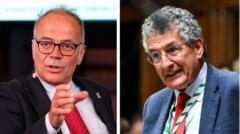Why Were Two Labour MPs Denied Entry to Israel?

Published: 2025-09-16 21:55:25 | Category: sport
Two Labour MPs, Simon Opher and Peter Prinsley, have reportedly been denied entry into Israel while attempting to visit the occupied West Bank to assess medical and humanitarian efforts. They were part of a parliamentary delegation aiming to understand the challenges faced by healthcare facilities in the region.
Last updated: 03 October 2023 (BST)
Key Takeaways
- Labour MPs Simon Opher and Peter Prinsley were denied entry into Israel while attempting to visit the West Bank.
- The MPs aimed to observe healthcare facilities and meet with British and Palestinian organisations.
- Israeli authorities cited "public order" as the reason for their denial of entry.
- This incident follows similar denials faced by other Labour MPs earlier in the year.
- The Council for Arab-British Understanding (CAABU) organised the visit to promote understanding of the situation on the ground.
The Context of the Visit
Opher and Prinsley were part of a delegation arranged by the Council for Arab-British Understanding (CAABU), an organisation dedicated to fostering dialogue and understanding between the UK and Arab communities. Their planned three-day visit aimed to shed light on the humanitarian and medical conditions in the West Bank, especially given the ongoing challenges faced by healthcare facilities in this politically sensitive area.
Why Were They Denied Entry?
According to reports, the MPs were stopped by Israeli authorities at the border crossing from Jordan. They were detained in a passport office before being formally notified that they were not permitted to enter Israel based on "public order" grounds. Opher expressed disappointment over the situation, stating their intention was not to challenge Israeli authority but to gain insights into healthcare struggles in the West Bank.
The Reaction from the MPs
Following their denial of entry, Opher expressed regret, stating, "It's very disappointing. We are both doctors and we were really just going to look at healthcare facilities in the West Bank." He emphasised that the intent was purely humanitarian, aimed at understanding the support needed for healthcare providers in the region.
The Broader Implications
This incident has raised concerns about the Israeli government's approach to foreign politicians, especially those from the UK who wish to understand the complexities of the Israeli-Palestinian conflict. Chris Doyle, the Director of CAABU, highlighted the importance of allowing British politicians to witness the realities on the ground, especially during such a critical time in the region.
Previous Incidents
Opher and Prinsley's experience is not an isolated case. Earlier in April 2023, two other Labour MPs, Abtisam Mohamed and Yuan Yang, were also denied entry into Israel during a visit organised by CAABU. Israeli authorities claimed that the MPs had made accusations against Israel and were involved in promoting sanctions against Israeli officials.
These incidents highlight a troubling trend where politicians seeking to engage with the realities of the Israeli-Palestinian situation face obstacles. Mohamed and Yang articulated their concerns, stating, "Parliamentarians should feel free to speak truthful in the House of Commons, without fear of being targeted."
Official Responses
The UK Foreign Office and the Israeli Embassy in London have been contacted for comments regarding these incidents, but responses have yet to be provided. The lack of official explanations may leave many questions unanswered about the criteria used by Israeli authorities to deny entry to foreign politicians.
Impact on UK-Israel Relations
These denials could potentially strain the relationship between the UK and Israel, particularly as they come at a time when discussions around Middle Eastern policy are increasingly complex. The then-Foreign Secretary, David Lammy, condemned the actions of Israeli authorities, calling them "unacceptable, counterproductive and deeply concerning." Such statements from UK officials may signal a growing frustration with Israel's handling of foreign engagement.
What Happens Next?
As the situation develops, it is essential to monitor how these incidents will influence future parliamentary visits to Israel and the West Bank. The ongoing challenges faced by healthcare facilities in the region continue to require attention and support from international bodies, including the UK government.
It remains to be seen whether these recent denials will prompt a reassessment of how such visits are conducted in the future, and whether the Israeli government will reconsider its approach to foreign parliamentarians seeking to understand the humanitarian issues at play.
Conclusion
The denial of entry to Labour MPs Simon Opher and Peter Prinsley underscores the complexities involved in the Israeli-Palestinian conflict, particularly as it pertains to international dialogue and humanitarian efforts. As the situation evolves, the need for transparent communication and understanding remains critical for fostering peace and cooperation in the region.
What steps do you think should be taken to ensure that humanitarian efforts in conflict zones are not hindered by political barriers? #Israel #WestBank #HumanRights
FAQs
Why were the Labour MPs denied entry to Israel?
Simon Opher and Peter Prinsley were denied entry based on "public order" grounds, as stated by Israeli authorities at the border crossing from Jordan.
What was the purpose of their trip to the West Bank?
The MPs intended to visit medical and humanitarian projects in the West Bank to understand the challenges faced by healthcare facilities in the region.
Has this happened before to other MPs?
Yes, in April 2023, two other Labour MPs, Abtisam Mohamed and Yuan Yang, were also denied entry into Israel during a similar visit organised by CAABU.
What was the reaction from the UK government?
The then-Foreign Secretary, David Lammy, described the denial of entry as "unacceptable, counterproductive and deeply concerning."
What does CAABU do?
The Council for Arab-British Understanding (CAABU) aims to promote dialogue and understanding between the UK and Arab communities, often facilitating visits for UK parliamentarians to gain insights into the region.



